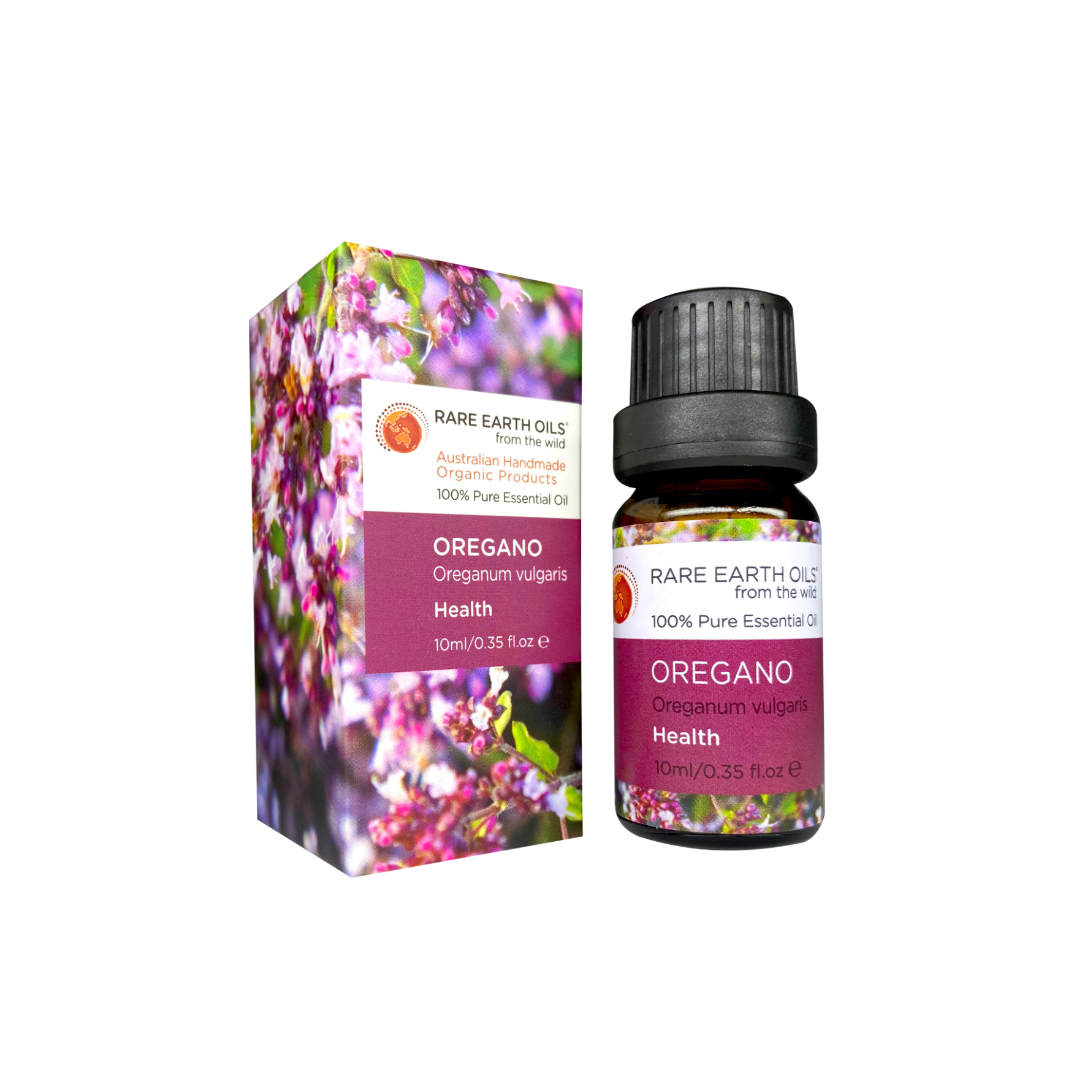

Oregano
Oregano oil is a formidable natural remedy. Accelerating recovery from coughs, colds, and illness, it triggers white blood cell production, bolstering the body's defences and boosting metabolism.
This powerful oil is renowned for its ability to enhance digestion and combat allergies and inflammation caused by environmental factors such as pollen and mould.
Oregano essential oil is potent and should always be diluted.
Aroma: Bold, herbacious, medicinal aroma with fresh minty undertones.
Note: Mid
Chakra: Heart
Status: Organic
Method of extraction: Steam distilled

Aromatherapy
Oregano’s invigorating scent can ease tension and stress, promoting mental clarity and emotional well-being. Its known to uplift mood and reduce fatigue, enhancing mental and emotional balance.
When diluted and applied to the abdomen or used in aromatherapy, it may help relieve digestive discomfort and stimulate healthy digestion.
Aiding faster recovery from coughs, colds and common illnesses, Oregano oil helps the body create more white blood cells and speeds up metabolism. It has also been said to improve digestion, strengthen bones and improve heart health.
Traditional Uses
Oregano oil can assist the body combat allergies and inflammation caused by environmental factors such as pollen and mould.
Oregano’s most important compounds are rosmarinic acid and thymol, both powerful antioxidants that have been linked to reducing oxidative stress in the body. Several studies have indicated that carvacrol, one of the compounds of oregano oil, may have cancer-fighting properties.
Diluted oregano oil can be used topically to alleviate muscle pain, headaches, and joint discomfort when applied as a massage oil or in a warm compress.
Safety
Avoid Oregano oil during pregnancy and seek advice from a medical professional during lactation.
ALWAYS USE OREGANO OIL DILUTED.
Caution should be taken when diffusing or inhaling, use only a few drops as this oil is very concentrated. When applied topically to the skin, Oregano oil should always be diluted with a carrier oil.
People with bleeding disorders should not take oregano oil as it may increase the risk of bleeding. Similarly, discontinue use of oregano oil two weeks before scheduled surgery due to concerns over bleeding risk.
Oregano oil may decrease blood sugar in people with diabetes and should be used cautiously.
Interactions
Oregano oil may interact with certain medications and supplements, and should not be taken with the following:
Antidiabetic drugs including glimepiride (Amaryl), glyburide (DiaBeta, Glynase PresTab, Micronase), insulin, metformin (Glucophage), pioglitazone (Actos), rosiglitazone (Avandia), and others. In addition, it should not be used with herbs and supplements that might lower blood sugar including alpha-lipoic acid, bitter melon, chromium, devil's claw, fenugreek, garlic, guar gum, horse chestnut, Panax ginseng, psyllium, Siberian ginseng, and others.
Anticoagulants including Some medications that slow blood clotting include aspirin, clopidogrel (Plavix), dabigatran (Pradaxa), dalteparin (Fragmin), enoxaparin (Lovenox), heparin, warfarin (Coumadin), and others. In addition, it should not be taken with herbs that interfere with blood clotting, including angelica, clove, danshen, garlic, ginger, ginkgo, Panax ginseng, horse chestnut, red clover, turmeric, and others.
Copper absorption may be decreased when taken with oregano oil.
Iron absorption may be decreased when taken with oregano oil.
Zinc absorption may be decreased when taken with oregano oil
It should be noted that the Physicians' Desk Reference for Herbal Medicines, Second Edition also points out that there are various chemotypes with differing essential oil composition of thymol, linalool + terpinene-4-ol, linalool, caryophyllene + germacren D, or germacren D as chief components. However, those strains, especially ones high in thymol, are not suitable for preparing oregano essential oil intended for internal consumption. Some of these essential oils are toxic to the liver and kidney in very small quantities. However prudent, short term, topical use of these variants may be safe.
Oregano’s invigorating scent can ease tension and stress, promoting mental clarity and emotional well-being. Its known to uplift mood and reduce fatigue, enhancing mental and emotional balance.
When diluted and applied to the abdomen or used in aromatherapy, it may help relieve digestive discomfort and stimulate healthy digestion.
Aiding faster recovery from coughs, colds and common illnesses, Oregano oil helps the body create more white blood cells and speeds up metabolism. It has also been said to improve digestion, strengthen bones and improve heart health.
Oregano oil can assist the body combat allergies and inflammation caused by environmental factors such as pollen and mould.
Oregano’s most important compounds are rosmarinic acid and thymol, both powerful antioxidants that have been linked to reducing oxidative stress in the body. Several studies have indicated that carvacrol, one of the compounds of oregano oil, may have cancer-fighting properties.
Diluted oregano oil can be used topically to alleviate muscle pain, headaches, and joint discomfort when applied as a massage oil or in a warm compress.
Avoid Oregano oil during pregnancy and seek advice from a medical professional during lactation.
ALWAYS USE OREGANO OIL DILUTED.
Caution should be taken when diffusing or inhaling, use only a few drops as this oil is very concentrated. When applied topically to the skin, Oregano oil should always be diluted with a carrier oil.
People with bleeding disorders should not take oregano oil as it may increase the risk of bleeding. Similarly, discontinue use of oregano oil two weeks before scheduled surgery due to concerns over bleeding risk.
Oregano oil may decrease blood sugar in people with diabetes and should be used cautiously.
Interactions
Oregano oil may interact with certain medications and supplements, and should not be taken with the following:
Antidiabetic drugs including glimepiride (Amaryl), glyburide (DiaBeta, Glynase PresTab, Micronase), insulin, metformin (Glucophage), pioglitazone (Actos), rosiglitazone (Avandia), and others. In addition, it should not be used with herbs and supplements that might lower blood sugar including alpha-lipoic acid, bitter melon, chromium, devil's claw, fenugreek, garlic, guar gum, horse chestnut, Panax ginseng, psyllium, Siberian ginseng, and others.
Anticoagulants including Some medications that slow blood clotting include aspirin, clopidogrel (Plavix), dabigatran (Pradaxa), dalteparin (Fragmin), enoxaparin (Lovenox), heparin, warfarin (Coumadin), and others. In addition, it should not be taken with herbs that interfere with blood clotting, including angelica, clove, danshen, garlic, ginger, ginkgo, Panax ginseng, horse chestnut, red clover, turmeric, and others.
Copper absorption may be decreased when taken with oregano oil.
Iron absorption may be decreased when taken with oregano oil.
Zinc absorption may be decreased when taken with oregano oil
It should be noted that the Physicians' Desk Reference for Herbal Medicines, Second Edition also points out that there are various chemotypes with differing essential oil composition of thymol, linalool + terpinene-4-ol, linalool, caryophyllene + germacren D, or germacren D as chief components. However, those strains, especially ones high in thymol, are not suitable for preparing oregano essential oil intended for internal consumption. Some of these essential oils are toxic to the liver and kidney in very small quantities. However prudent, short term, topical use of these variants may be safe.





